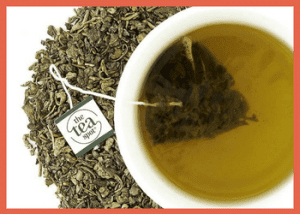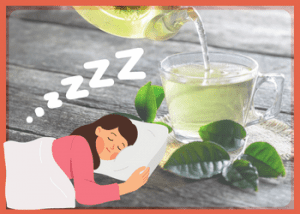Absolutely. Green tea contains caffeine, though the content may vary depending on its type and production process. There are several factors that can influence how much of this stimulant is in each cup – so take note if you’re looking for a certain level of stimulation.
For instance, the harvest season of tea leaves can influence their caffeine content. A younger crop of tea leaves may contain more caffeine since longer oxidation periods decrease the concentration of this chemical compound. As such, earlier harvests will have a much higher amount than those gathered later in the year.
As time passes between harvests, the tea produces larger amounts of polyphenols. Remarkably, these polyphenols can bind to the caffeine in our cup and decrease its bioavailability when we drink it.
Moreover, the temperature at which you brew your tea as well as how you steep it can alter caffeine levels. Utilizing cold brewing will draw out less caffeine than hot brewing. Additionally, brewing time is a factor – if you steep green tea for 5 minutes in boiling water versus 15 minutes, not only will the amount of caffeine be lower but also taste much milder.
Consequently, the amount of caffeine in your cup may vary depending on a multitude of factors even though green tea does contain some.
Table of Contents
Green Tea Benefits and Side Effects
| Benefits | Description | Scientific Evidence |
|---|---|---|
| Weight Loss | It contains catechins and caffeine that can increase metabolism and fat burning. | A 12-week study showed that participants who drank green tea lost more body fat than those who didn’t. |
| Heart Health | It may reduce cholesterol levels and lower blood pressure. | A study found that drinking green tea regularly was associated with a reduced risk of developing heart disease. |
| Cancer Prevention | It is high in antioxidants that can help protect against cancer. | Some studies have suggested that green tea may reduce the risk of certain types of cancer, such as breast and prostate cancer. |
| Brain Function | It contains caffeine and L-theanine which can improve brain function and alertness. | A study found that caffeinated green tea can improve cognitive function and reduce the risk of developing Alzheimer’s disease. |
| Side Effects | Description | Scientific Evidence |
|---|---|---|
| Caffeine Sensitivity | It contains caffeine that can cause jitters, anxiety, and disrupted sleep for some people. | Individuals who are sensitive to caffeine should limit their green tea consumption or choose decaffeinated varieties. |
| Iron Absorption | It may decrease the absorption of iron from food, especially in people with iron deficiency anemia. | Individuals with anemia should consume green tea in moderation and with food to avoid interfering with iron absorption. |
| Stomach Upset | It contains tannins that can irritate the digestive system and cause stomach upset, nausea, and vomiting in some people. | Drinking green tea on an empty stomach may exacerbate these symptoms. |
| Headaches | It contains tyramine, an amino acid that can trigger headaches in some individuals. | People who are prone to headaches should limit their intake of green tea or avoid it altogether. |
| Interactions with Medications | Green tea may interact with certain medications, such as blood thinners and antidepressants, and affect their effectiveness. | Individuals taking medications should talk to their doctor before consuming green tea regularly. |
Is Green Tea Good for You?
Craving a thirst-quenching and tasty drink that is also healthy? Look no further than green tea! It’s widely regarded as one of the most beneficial beverages on the planet because it contains antioxidants, nutrients, and other healthful components. Plus, its flavor will tantalize your taste buds without having to feel guilty about what you’re drinking!
Want to slim down? Drinking green tea can help. Studies showcase that consuming this miracle liquid accelerates your metabolism, igniting fat-burning processes and ultimately working as an effective strategy for weight loss.
Not only that – green tea aids in controlling blood sugar levels, helping you avoid diabetes and other metabolic diseases. So grab a mug of flavorful – yet healthful -green tea today and start reaping the benefits!
 Beyond weight loss, it offers a myriad of health benefits.
Beyond weight loss, it offers a myriad of health benefits.
Packed with catechins – natural antioxidants that protect cells from damage and reduce the risk of chronic diseases – it can also enhance brain function and memory. In fact, it’s often included in nootropic supplements for this reason.
Not only is green tea a refreshing beverage, but it can also be beneficial for your heart health. Studies have shown that its consumption may help lower cholesterol levels and blood pressure while reducing the likelihood of cardiovascular illness.
The efficacy of this drink lies in the presence of epigallocatechin gallate (EGCG), an antioxidant that helps to avert LDL cholesterol oxidation and prevents plaque buildup in arteries.
Green tea has been known to offer a myriad of other benefits, such as preventing certain types of cancer, bettering dental health, and relieving inflammation in the body.
And since green tea contains significantly less caffeine than coffee does, it is an ideal substitute for those craving a healthier source of stimulants.
It’s essential to remember that green tea is not a one-size-fits-all solution. While it does offer numerous health benefits, it won’t fix any underlying medical issues you may have.
Nevertheless, adding green tea to your daily lifestyle can be an effortless and enjoyable way of boosting your overall physical and mental well-being.
Caffeine in Green Tea vs Coffee
How much caffeine is in green tea vs coffee? There’s a comparing table:
| Category | Green Tea | Coffee |
|---|---|---|
| Caffeine content | 30-50 mg per cup | 95 mg per cup |
| Benefits | Rich in antioxidants which may have anti-inflammatory and cancer-fighting properties, may improve brain function and reduce the risk of certain diseases | May improve mental alertness, may reduce the risk of certain diseases |
| Side effects | May cause jitters or anxiety, and may affect sleep quality if consumed late in the day | May cause jitters or anxiety, and may disrupt sleep if consumed late in the day |
| Which is better? | Depends on personal preference and individual tolerance to caffeine | Depends on personal preference and individual tolerance to caffeine |
While coffee has a higher caffeine content than green tea, both beverages offer their own unique benefits and side effects. Does green tea have calories? On its own, without any added sugar or milk, an 8-ounce cup of green tea typically contains less than 5 calories.
Mayo Clinic and Pubmed say that green tea is rich in antioxidants that may have anti-inflammatory and cancer-fighting properties, while coffee may improve mental alertness and reduce the risk of certain diseases. Ultimately, the choice between the two will depend on personal preference and individual tolerance to caffeine.
What Has More Caffeine Coffee or Green Tea?
Unlike green tea, which typically has 30-50 mg of caffeine per 8 ounces, coffee carries a substantially higher amount of caffeine – the sum depends on variables like brewing method and type of bean.
So if you’re wanting an energy boost without taking in too much caffeine, reach for some fragrant green tea instead. Yet, the caffeine levels in green tea can differ significantly based on its variety and brewing techniques.
Caffeine in Green Tea vs Black Tea
When comparing caffeine concentrations between green and black tea, the amounts can vary depending on preparation and type. To help you understand the differences in content and possible benefits or adverse effects of each one, here’s a comparison table for your reference:
| Green Tea | Black Tea | |
|---|---|---|
| Caffeine content | 35-70 mg per 8 oz | 60-90 mg per 8 oz |
| Potential benefits | May improve brain function, increase fat burning, and reduce the risk of certain diseases | May improve heart health, lower the risk of stroke, and reduce the risk of certain cancers |
| Potential side effects | May cause anxiety, disrupt sleep, increase heart rate and blood pressure | May cause anxiety, disrupt sleep, increase heart rate and blood pressure |
| Which is better? | Both can have health benefits, chosen based on personal preference and sensitivity to caffeine |
It bears noting that the caffeine levels of tea may fluctuate depending on its type, quantity used, and steeping duration.
Some individuals may be more susceptible to caffeine and suffer from side effects such as insomnia, anxiety, or raised blood pressure. Therefore it is important to pay attention to how much tea one consumes in order to avoid adverse reactions.
Whichever tea you prefer, both green and black teas provide numerous health benefits. Make sure to select a type that fits your own caffeine needs and taste preferences for the most enjoyment. With a balanced diet, including either kind of tea can be beneficial.
Frequently Asked Questions
Is Green Tea Very High in Caffeine?
If you’re looking for a more caffeine-friendly alternative to coffee, try green tea! Compared to the 95-165 mg of caffeine per 8 oz. cups of brewed coffee, 8 oz. cups of brewed green tea offer only 25-29mg of caffeine – significantly lower than those found in coffee. And while it might not give you the same energy boost or taste as your favorite cup of joe, this gentler beverage can still be enjoyed without worrying about overwhelming levels of caffeine intake.
Does Green Tea Keep You Awake?
Yes. Green tea contains limited amounts of caffeine, a natural stimulant that offers alertness and focuses while diminishing feelings of fatigue – all of which can make it tougher to drift off into dreamland (15). One cup (240ml) provides around 30 mg. This equals roughly 1/3 the amount found in one cup of coffee.
Are All Green Teas Caffeine Free?
Tea, in its truest form, is derived from one sole source – the Camellia sinensis plant. From this single-origin plant sprouts all four varieties of tea – Green, Oolong, Black, and White; each containing traces of caffeine. Alternatively, herbal teas are created using non-Camellia sinensis sources yet most do not contain any trace of coffee alkaloids thanks to their different compositions.
Does Green Tea Help You Lose Weight?
 It may help with weight loss due to its caffeine content, which can increase metabolism and fat burning, as well as its high concentration of antioxidants called catechins that may help reduce inflammation and promote fat loss.
It may help with weight loss due to its caffeine content, which can increase metabolism and fat burning, as well as its high concentration of antioxidants called catechins that may help reduce inflammation and promote fat loss.
However, it’s important to note that drinking green tea alone is not a magic solution for weight loss and should be combined with a healthy diet and exercise routine for the best results.
Does Green Tea Help You Sleep?
While green tea contains theanine, which may promote relaxation, it also contains caffeine, which can disrupt sleep, so it’s not recommended to consume before bed.
How Much Caffeine in Green Tea?
On average, an 8-ounce cup of green tea contains between 30-50 milligrams of caffeine. However, this can range from as little as 15 milligrams to as much as 75 milligrams.
Conclusion
Yes, green tea does contain caffeine; yet it has less than both black and coffee. You may experience a small energy boost from drinking green tea without the harsh crash that accompanies caffeinated beverages with high levels of caffeine. In other words, you get your jolt without the sudden drop-off afterward!
As a stimulant, caffeine can make you more alert. On average, it requires four to six hours for your body to break down half of the amount consumed.
If you notice that having a cup of coffee or tea later in the day keeps you from sleeping soundly at night, try opting for an herbal blend such as mint or chamomile instead since they typically contain less caffeine than other options.
